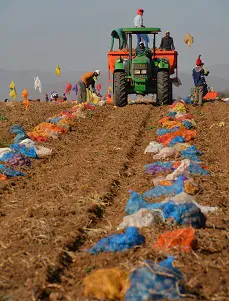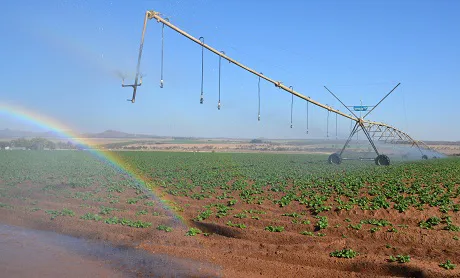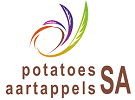 The South African potato industry, which competes in yield and quality with the best in the world, is keen to explore the prospects of increased global trade in potatoes.
The South African potato industry, which competes in yield and quality with the best in the world, is keen to explore the prospects of increased global trade in potatoes.
Currently 20 to 25% of South African potato production goes for processing (mostly crisps and French fries) but that is a segment Potatoes South Africa would like to see grow, after some stagnation over the past few years linked to the slowing economy.
Not only that, but the innovative applications of potatoes in confectionery, bread and pasta as showcased at the 2015 World Potato Congress has served as inspiration to broaden the horizons of Potatoes South Africa, explains Dr André Jooste, CEO of the potato industry body.
“We recently attended Asia Fruit Logistica in Hong Kong in an exploratory capacity and to make contact with Chinese processing firms as well as with importers with established networks in Asia. We learned an immense amount,” he says. “There are strong opportunities and interest from the Middle East, already an export destination for South Africa, and from countries to the west of China. Of course, the more eastwards you move in Asia, the more you would encounter competition from Australia and South America.”
Their immediate focus, he notes, is Africa, where potato consumption is buoyed by a growing middle class.
Seed certification scheme “one of best in the world”
The South African yield per hectare, at an average 47 tonnes per hectare, is up there with the USA, Germany and the Netherlands. The quality of South African seed potatoes is attracting attention, with frequent international visits showing great interest in South Africa’s ability to grow excellent quality seed under the country’s Seed Potato Certification Scheme which is, Dr Jooste says, one of the best in the world.
“Everything starts with seed, you could say it’s a seed value chain, and within that chain we have exceptional cooperation and dialogue between government and the industry, comprising not only seed potato producers, but also table potato producers and processing potato producers. It’s all about the integrity in carrying out the stipulations, the level of our laboratories, the rigorous training of seed certification officers employed by the Seed Potato Certification Service.”
The area under seed potatoes is the highest it’s ever been, following an upward trend over the past few years.
He continues: “South African potato producers obtain the best possible seed for production and as a result our potatoes are of a very high quality. When you ask potato producers in other African countries what the single most limiting factor is to higher yields, the answer is always: inferior seed.”
Increase in non-tariff barriers as African industries develop
South Africa already exports seed potatoes to potato producers in neighbouring countries (with strong potential interest from other parts of the world like South America), forming part of the eight to ten percent of the national volumes that are exported.
Dr Jooste expects that with the development of local potato industries in countries north of South Africa, non-tariff barriers like phytosanitary measures will play an increasing role in intra-African trade. Already some countries in the Southern African Customs Union are infamous for abruptly closing borders to South African fresh produce in an attempt to protect fledgling local industries from imports.

Within the Southern African region, South Africa is the largest and most technologically advanced potato producer (production of around 2.5 million tonnes annually, mostly under irrigation), leading the way where producers in Namibia and Botswana are starting to follow.
Potato farms down by 75% over 25 years but yield soars
“Our farmers know what it’s about and you have to take your hat off to what they’re achieving within an environment of immense cost pressures,” he says (and South African farmers receive zero government subsidies). “When you look at input costs, transport, marketing – on a potato farm under irrigation, production and marketing costs come to between R160,000 (9,600 euros) and R240,000 (14,400 euros) per hectare.”
The number of commercial potato production units in South Africa is a quarter of what it was 25 years ago in a strong inverse relationship to yield.
What’s more, he points out, is the value added to potato production by farm-based packhouses (not to mention additional employment) where potatoes are washed and sorted before bagging, unlike in many other African and South American countries where potatoes are bagged right there in the field and sent to market as is. (South African potato farmers also take great pride in their colourful branded potato bags.)
“Our strategic positioning with regards to product innovation and new export opportunities is by necessity a long-term strategy. International trade is a very complex environment and our mandate is to convey this complexity to our members in order for them to take well-informed decisions.”
For more information: Dr André Jooste
Dr André Jooste
Potatoes SA
Tel: +27 12 349 1906
Email: ajooste@potatoes.co.za
http://www.potatoes.co.za/
